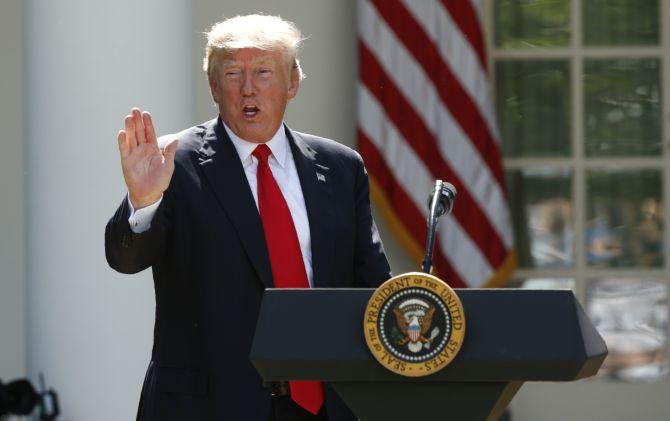
In a significant victory for President Donald Trump, the United States Supreme Court has backed his controversial travel ban targeting people from six Muslim-majority countries, allowing its immediate enforcement.
The travel ban is the third version of a contentious policy that Trump first sought to implement a week after taking office in January.
As a result of the 7-2 vote by the Supreme Court, Trump’s travel ban, which restricts travel to the US by people from Iran, Libya, Syria, Yemen, Somalia and Chad without bona fide connections to America, can take full effect while legal challenges proceed.
Seven of the nine judges lifted restrictions on the travel ban imposed by other courts earlier. Justice Ruth Bader Ginsburg and Justice Sonia Sotomayor said they would have denied the government’s request.
The court gave no reason for its decision, but said it expected lower court review of the executive orders to proceed quickly.
“Multiple government agencies have conducted a comprehensive, worldwide review of the information shared by foreign governments that is used to screen aliens seeking entry to the US,” US Solicitor General Noel Francisco argued in court papers.
“We are not surprised by today’s Supreme Court decision permitting immediate enforcement of the President’s proclamation limiting travel from countries presenting heightened risks of terrorism,” White House spokesman Hogan Gidley said after the order.
The Supreme Court order is a significant win for the Trump administration, which has fought all year to impose a travel ban against citizens of several Muslim-majority countries. The order means it can be enforced while challenges to the policy make their way through the legal system, US media reported.
The Trump administration has maintained that the president has the authority to install travel bans in order to protect national security and protect the country from terror attacks.
Trump’s travel ban was challenged by Hawaii and American Civil Liberties Union in separate lawsuits. They argued that such a ban discriminated against Muslims.
“It is difficult to conceive of a more flagrant example of discrimination because of nationality,” said Indian-American attorney Neal Katyal, who appeared for Hawaii.
New York Immigration Coalition Executive Director Steven Choi said it was entirely unacceptable and un-American to discriminate against people based on race or religion.
“Allowing the full enforcement of the Muslim ban will not make this country safer or greater. Nearly a year after we rallied at JFK in response to the first Muslim ban, we will continue to fight Trump’s plan to turn bigotry into policy and resist this latest assault on our liberties just as we have every day since Trump took office,” Choi said.
Michael S Glassner, executive director of Donald J Trump for President campaign committee, welcomed the decision.
“From June 16, 2015 to this day, President Trump’s immigration policies have always been about one thing: keeping Americans safe from people who seek to do us harm and attack our freedoms,” he said.
“As promised, the president directed his administration to conduct a thorough and appropriate review of immigration vetting procedures, in place under the previous administration, to ensure that terrorist attacks do not occur on American soil,” he said.
“Now that the Supreme Court has ordered the lifting of restrictions on this ban, minimum security standards for entry into the US can be enforced,” he added.
All Americans should take heart that President Trump is fully committed to Making America Safe Again, and will continue the fight to ensure their safety no matter what, Glassner said.
Omar Jadwat, director of the ACLU’s Immigrants’ Rights Project, said that it was unfortunate that the full ban can move forward for now.
“This order does not address the merits of our claims. We continue to stand for freedom, equality, and for those who are unfairly being separated from their loved ones. We will be arguing Friday in the Fourth Circuit that the ban should ultimately be struck down,” Jadwat said.











 © 2025
© 2025